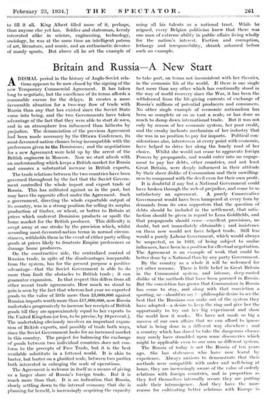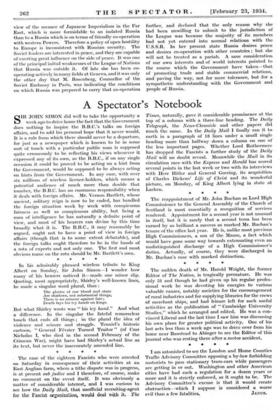Britain and Russia —A New Start
ADISMAL period in the history of Anglo-Soviet rela- tions appears to be now closed by the signing of the new Temporary Commercial Agreement. It has taken long to negotiate, but the excellence of its terms affords a reasonable excuse for the delays. It creates a more favourable situation for a two-way flow of trade with Russia than any that has existed since the Soviet State came into being, and the two Governments have taken advantage of the fact that they were able to start de noro, and in an atmosphere less influenced than hitherto by prejudice. The denunciation of the previous Agreement had been made necessary by the Ottawa Conference, its most-favoured-nation clauses being incompatible with the preferences given to the Dominions; and the negotiations for a new Agreement were held up by the arrest of the British engineers in Moscow. Now we start afresh with an understanding which keeps a British market for Russia and ensures a substantial increase in British exports.
The trade relations between the two countries have been governed throughout by the fact that the Soviet Govern- ment controlled the whole import and export trade of Russia. This has militated against us in the past, but may have the opposite effect under the Agreement. Such a government, directing the whole exportable output of its country, was in a strong position for selling its surplus production of timber, or wheat, or butter to Britain at prices which undercut Dominion products or spoilt the home market for the British producer. This difficulty is swept away at one stroke by the provision which, whilst according most-favoured-nation terms in normal circum- stances, withholds them in the event of either party selling goods at prices likely to frustrate Empire preferences or damage home producers.
On the constructive side, the centralized control of Russian trade, in spite of the disadvantages inseparable from the system, has for the present purpose a positive advantage—that the Soviet Government is able to do more than limit the obstacles to British trade ; it can guarantee expansion. In that respect this differs from all other recent trade agreements. How much we stand to gain is seen by the fact that whereas last year we exported goods to the value of little more than £3,000,000 against Russian imports worth more than £17,000,000, now Russia undertakes progressively to increase her receipts of British goods till they are approximately equal to her exports to the United Kingdom (or less, to be precise, by 10 percent.). The undertaking obviously involves an important expan- sion of British exports, and possibly of trade both ways, since the Soviet Government looks for an increased market in this country. The project for balancing the exchange of goods between two individual countries does not con- form to the precepts of Free Trade, but it is the best available substitute in a fettered world. It is akin to, barter, but barter on a glorified scale, between two parties both interested in enlarging the scale of operations.
The Agreement is welcome in itself as a means of giving us a larger share of Russia's foreign trade. But it is much more than that. It is an indication. that Russia, slowly settling down to the internal economy that she is planning for herself, is increasingly acquiring the capacity to take part, on terms not inconsistent with her theories, in the economic life of the world. If there is one single fact more than any other which has continually stood in the way of world recovery since the War, it has been the withdrawal from the life-giving currents of exchange of Russia's millions of potential producers and consumers. No other single example of economic nationalism has been so complete or on so vast a scale, or has done so much to damp down international trade. But it was not only by reason of her economic system, her poor credit, and the creaky inchoate mechanism of her industry that she was in no position to pay for imports. Political con- siderations also, interwoven at every point with economic, have helped to drive her along the lonely road of her choice. Whilst she would not cease to aggravate foreign Powers by propaganda, and would enter into no engage- ment to pay her debts, other countries, and not least Great Britain, were deeply influenced in their attitude by their sheer dislike of Communism and their unwilling- ness to compound with the devil even for their own profit.
It is doubtful if any but a National Government could have broken through the web of prejudice, and come to so satisfactory an agreement. A purely Conservative Government would have been hampered at every turn by demands from its own supporters that the question of debts should be included in the settlement, that satis- faction should be given in regard to Lena Goldfields, and that propaganda should cease—excellent provisions, no doubt, but not immediately obtainable ; and insistence on them now would not have helped trade. Still less would a purely Labour Government, which would always be suspected, as in 1923, of being subject to undue influences, have been in a position for effectual negotiation. The Agreement is an example of work that could be better done by a National than by any party Government.
By the country as a whole it will be welcomed for yet other reasons. There is little belief in Great Britain in the Communist system, and intense, deep-rooted dislike of the methods that have been pursued in Russia. But the conviction has grown that Communism in Russia has come to stay, and along with that conviction a sporting, or—should we say ?--philosophic desire to sec the best that the Russians can make out of the system they have adopted—a desire to keep the ring and give her the opportunity to try out her big experiment and show the world how it works. We have not made so big a success of our own affairs that we can afford to ignore what is being done in a different way elsewhere ; and a country which has dared to take the dangerous chance may surely have stumbled upon some discoveries which might be applicable even to our own so different system.
The Russia of today is not the Rrissia of ten years ago. She has statesmen wbo haVe now learnt by experience. Always anxious to demonstrate that their methods Were compatible with order and well-being at home, they are increasingly aware of the value of orderly relations with foreign countries, and in proportion as they feel themselves internally secure they are putting aside their intransigence. And they have the more reason for cultivating better relations with Europe in view of the menace of Japanese Imperialism in the Far East, which is more formidable to an isolated Russia than to a Russia which is on terms of friendly co-operation with western Powers. Therefore a policy of open hostility to Europe is inconsistent with Russian security. The Soviet leaders are interested in peace, and they are capable of exerting great influence on the side of peace. It was one of the principal initial weaknesses of the League of Nations that Russia was outside it. Of late she has been co- operating actively in many fields at Geneva, and it was only the other day that M. Rosenberg, Counsellor of the Soviet Embassy in Paris, was indicating the conditions on which Russia was prepared to carry that co-operation further, and declared that the only reason why she had been unwilling to submit to the jurisdiction of the League was because the majority of its members had not yet entered into normal relations with the U.S.S.R. In her present state Russia desires peace and desires co-operation with other countries ; but she will not be treated as a pariah. A sane consideration of our own interests and of world interests pointed to the course which the Government have taken—that of promoting trade and stable commercial relations, and paving the way, not for mere tolerance, but -for a sympathetic understanding with the Government and people of Russia.

















































 Previous page
Previous page